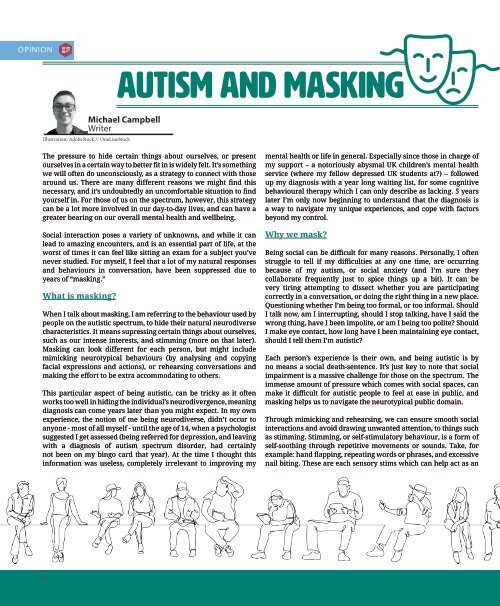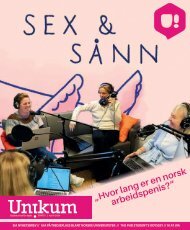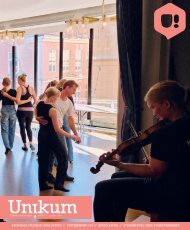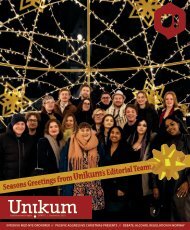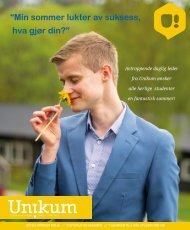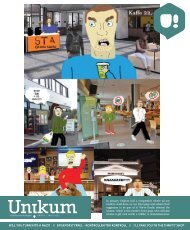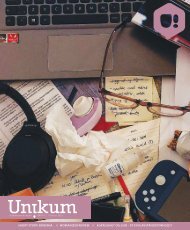NOVEMBER_UNIKUM_WEB
Create successful ePaper yourself
Turn your PDF publications into a flip-book with our unique Google optimized e-Paper software.
OPINION<br />
Autism and masking<br />
Michael Campbell<br />
Writer<br />
Illustration: AdobeStock // OneLineStock<br />
The pressure to hide certain things about ourselves, or present<br />
ourselves in a certain way to better fit in is widely felt. It’s something<br />
we will often do unconsciously, as a strategy to connect with those<br />
around us. There are many different reasons we might find this<br />
necessary, and it’s undoubtedly an uncomfortable situation to find<br />
yourself in. For those of us on the spectrum, however, this strategy<br />
can be a lot more involved in our day-to-day lives, and can have a<br />
greater bearing on our overall mental health and wellbeing.<br />
Social interaction poses a variety of unknowns, and while it can<br />
lead to amazing encounters, and is an essential part of life, at the<br />
worst of times it can feel like sitting an exam for a subject you’ve<br />
never studied. For myself, I feel that a lot of my natural responses<br />
and behaviours in conversation, have been suppressed due to<br />
years of “masking.”<br />
What is masking?<br />
When I talk about masking, I am referring to the behaviour used by<br />
people on the autistic spectrum, to hide their natural neurodiverse<br />
characteristics. It means supressing certain things about ourselves,<br />
such as our intense interests, and stimming (more on that later).<br />
Masking can look different for each person, but might include<br />
mimicking neurotypical behaviours (by analysing and copying<br />
facial expressions and actions), or rehearsing conversations and<br />
making the effort to be extra accommodating to others.<br />
This particular aspect of being autistic, can be tricky as it often<br />
works too well in hiding the individual’s neurodivergence, meaning<br />
diagnosis can come years later than you might expect. In my own<br />
experience, the notion of me being neurodiverse, didn’t occur to<br />
anyone - most of all myself - until the age of 14, when a psychologist<br />
suggested I get assessed (being referred for depression, and leaving<br />
with a diagnosis of autism spectrum disorder, had certainly<br />
not been on my bingo card that year). At the time I thought this<br />
information was useless, completely irrelevant to improving my<br />
mental health or life in general. Especially since those in charge of<br />
my support – a notoriously abysmal UK children’s mental health<br />
service (where my fellow depressed UK students at?) – followed<br />
up my diagnosis with a year long waiting list, for some cognitive<br />
behavioural therapy which I can only describe as lacking. 5 years<br />
later I’m only now beginning to understand that the diagnosis is<br />
a way to navigate my unique experiences, and cope with factors<br />
beyond my control.<br />
Why we mask?<br />
Being social can be difficult for many reasons. Personally, I often<br />
struggle to tell if my difficulties at any one time, are occurring<br />
because of my autism, or social anxiety (and I’m sure they<br />
collaborate frequently just to spice things up a bit). It can be<br />
very tiring attempting to dissect whether you are participating<br />
correctly in a conversation, or doing the right thing in a new place.<br />
Questioning whether I’m being too formal, or too informal. Should<br />
I talk now, am I interrupting, should I stop talking, have I said the<br />
wrong thing, have I been impolite, or am I being too polite? Should<br />
I make eye contact, how long have I been maintaining eye contact,<br />
should I tell them I’m autistic?<br />
Each person’s experience is their own, and being autistic is by<br />
no means a social death-sentence. It’s just key to note that social<br />
impairment is a massive challenge for those on the spectrum. The<br />
immense amount of pressure which comes with social spaces, can<br />
make it difficult for autistic people to feel at ease in public, and<br />
masking helps us to navigate the neurotypical public domain.<br />
Through mimicking and rehearsing, we can ensure smooth social<br />
interactions and avoid drawing unwanted attention, to things such<br />
as stimming. Stimming, or self-stimulatory behaviour, is a form of<br />
self-soothing through repetitive movements or sounds. Take, for<br />
example: hand flapping, repeating words or phrases, and excessive<br />
nail biting. These are each sensory stims which can help act as an<br />
8


